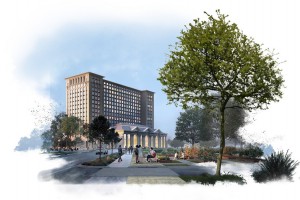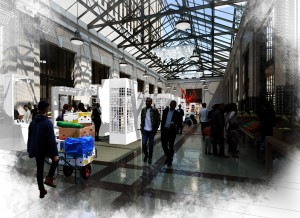
Ford's acquisition of the Michigan Central Station will serve at the catalyst for the company's new mobility-centered campus.
Ford Motor Co. acquired Michigan Central Station last week in Detroit’s Corktown neighborhood for an undisclosed sum and undisclosed plans — until now.
The automaker, which has said it will remain headquartered in nearby Dearborn, Michigan, plans to unveil its long-term plans for the former train station and several surrounding properties it also purchased to the public tomorrow.
However, a few important details were revealed today, including that it will serve as an innovation hub for Ford’s vision for the future of transportation.
In addition to the station, Ford has purchased the former Detroit Public Schools Book Depository, two acres of vacant land, the site of an old brass factory and the recent purchase of a refurbished former factory in Corktown, now home to Ford’s electric vehicle and autonomous vehicle business teams.
(Deal done! Ford buys Michigan Central Station. Click Here for the story.)

A rendering of what Ford's new campus, including Michigan Central Station, in Corktown will look like.
“Michigan Central Station is a powerful symbol of Detroit’s struggles and now its resurgence, but Ford’s investment in Corktown is far from symbolic,” said Bill Ford, the company’s executive chairman, in a statement.
“We aren’t just making a bet on Detroit. We are making a big bet on the future for Ford and the future of transportation. It’s exciting to imagine what’s possible as we build tomorrow, together.”
The campus will be comprised of approximately 1.2 million square feet of property in Corktown, and it will be a mixed-use space with office and retail properties as well as some residential housing. It will be home to about 2,500 Ford employees, mostly tied to its mobility team.
(What’s going on at “The Factory”? Click Here for more on Ford’s new project.)
Ford expects to have the campus full-staffed by 2022. There will also be space to accommodate 2,500 additional employees of partners and other businesses amongst Michigan Central Station and the other developments.

Ford sees opportunity for community groups and local businesses to be a thriving part of the Market Hall experience in Michigan Central Station.
The automaker has been looking for ways to attract new, young, tech-oriented talent to the region, and this separation from Dearborn, a small bedroom community on Detroit’s western border, may have that right mix of city life and well-paying jobs to do the trick.
Long a Detroit eye sore, the station was once a crown jewel of Detroit. It was the world’s tallest train depot when it opened in 1914 and served more than 200 trains a day at its peak in the 1940s. However, as the automobile took root, rail travel declined and Amtrak abandoned the station in 1988.
(For more on Ford’s possible plans for the Michigan Central Station, Click Here.)
A series of renovation plans have failed to come to fruition and vandals largely destroyed the once-elegant facility’s grand lobby and façade over the years. Previous owner Manuel “Matty” Moroun, was repeatedly faulted for failing to maintain the building, though he recently replaced the station’s windows and fixed some of its elevators, at an estimated cost of $8 million.
